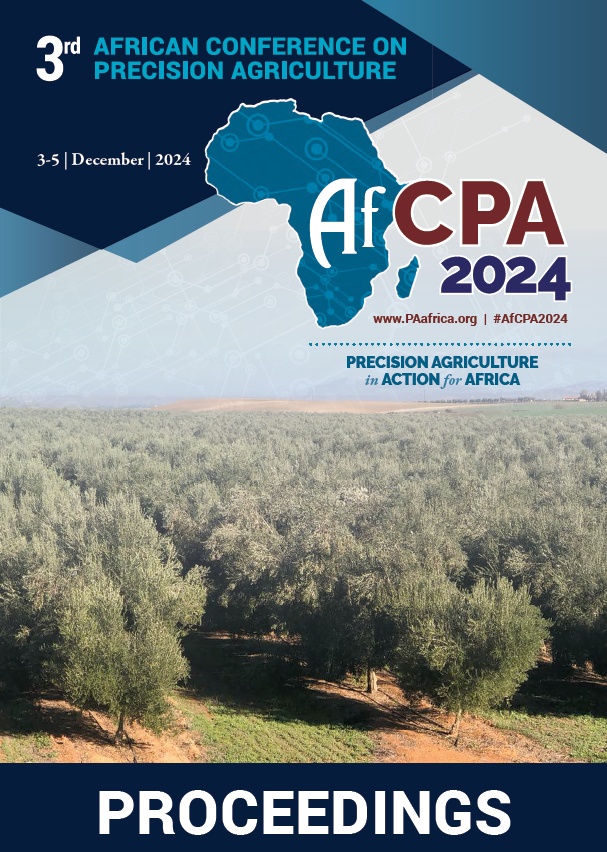Download the Conference Proceedings
Proceedings
Authors
| Filter results10 paper(s) found. |
|---|
1. Preparation of a precision ripping plan using manual vertical penetrometer measurementsLarge weight power engines and tools used in agriculture significantly contribute to the formation of compacted and thickening layers starting from the soil surface. There are suitable deep ripping technologies to eliminate harmful soil compaction, which are extremely energy and cost demanding. In precision agriculture, it is possible to treat spatially delimited unfavourable soil patches. The bulk density (g/cm3) of the soil was calculated from the soil resistance and moisture content... T. Rátonyi, P. Ragán, A. Széles, P. Fejér, E. Harsányi, I. Bácskai |
2. A cheap alternative to data management and creating of yield maps of small-plot field experimentsLong-term field trials provide an opportunity to examine the long-term effects of crop production factors and the effect of different crop years can also be analysed. In the long-term field trial, spatial representation of the data belonging to each plot might be necessary for the purpose of soil heterogeneity analysis, working hypothesis, or even presentation. Researchers dealing with long-term field trials usually store the measurement data for a given experiment in Excel or in a database of... P. Ragán, T. Rátonyi, A. Széles, P. Fejér, I. Bácskai, E. Harsányi |
3. Soil mapping with the VERIS U3 soil scanner in a precision farm in HungaryCurrently, field crop production faces constant challenges. Extreme climatic conditions, deteriorating circumstances on the field have a negative impact on the quantity and quality of available yields, and the ever-changing agro-economic environment makes the profitability of the sector uncertain. Precision crop production means site-specific agricultural cultivation tied to geographical coordinates. Modern strip tillage technology based on precision technology for crops with wide row spacing... P. Ragán, E. Harsányi, T. Rátonyi, A. Széles, P. Fejér, I. Bácskai |
4. EFFECT OF INTERCROPPING SORGHUM WITH COWPEA AND NITROGEN APPLICATION ON GROWTH AND YIELD OF SORGHUM (Sorghum bicolor (L.) MOENCH)Despite the development of improved varieties, the yield of sorghum has remained significantly low in dryland environments due to low soil fertility and inappropriate cropping practices. However, implementation of precision agriculture (PA) within the context of companion cropping with legumes and fine-tuning the supply of fertilizer nitrogen (N) has the potential to increase sorghum yield in these environments. Nonetheless, the effect sorghum-cowpea compatibility, fertilizer N use and their interaction... P.E. Moi , O.M. Kitonyo, G.N. Chemining’wa, J.M. Kinama |
5. Performance agronomique et économique de différentes stratégies de gestion de la fertilité du sol sous culture de soja (Glycine max L. Merril) dans la zone littorale du Togo.Ce travail a pour objectif de valoriser les émondes de deux légumineuses arbustives et quelques fertilisants organiques pour améliorer la production du soja. Afin de parvenir à cet objectif, les paramètres comme la masse de mille graines, les rendements en gousses, en graines, en fanes du soja et autres ont été déterminés. L’étude a eu lieu à la Station d’Expérimentation Agronomique de Lomé (SEAL)... K.M. Amouzouvi, K.E. Ozou, L. Kolani, K.A. Amouzouvi, J.M. Sogbedji |
6. Deep Learning is bringing pan-African small holder advisory services based on mid-infrared spectroscopic soil analysis to the next levelThe majority of African smallholder farmers do not have access to soil analytical services. The main reasons are relatively high costs of wet chemical services and difficult logistics. As a result they have to rely on blanket fertilizer recommendations. This often causes poor soil management due to very heterogeneous soil conditions. As a result, the return on investment from blanket fertilizer recommendations is low and fertilizer acceptance is not growing among smallholder farmers. Soil spectral... T. Terhoeven-urselmans, D. Fletcher, M.M. Karanja, J.W. Kamau |
7. Nutrient Quality Studies of Fluted Pumpkin (Telfairia Occidentalis Hook. F) Leaves as Influence by Fertilizer Micro-dosing and TimeThe nutrient qualities of vegetables have been noted to be affected by agronomic practices. The study evaluated the effect of fertilizer micro-dosing and time of application on nutrient quality of fluted pumpkin. The field experiment was carried out during 2017/2018 cropping season at the Teaching and Research Farm, Obafemi Awolowo University (O.A.U), Ile-Ife, situated within the forest zone (latitude 070 28’N and longitude 040 33’East and 224 m above sea level). The experiment was... |
8. The effectiveness of Neem materials and biochar as nitrification inhibitors in reducing nitrate leaching in a compost-amended Ferric LuvisolNitrate produced after mineralization from compost may be prone to leaching especially in Tropical sandy soils, because of increased rate of nitrification and the porous nature of such soils. This may result in low N use efficiency and adverse environmental effects. Inorganic nitrification inhibitors are costly and mostly unavailable in Ghana. The use of simple but effective local materials as nitrification inhibitors is therefore a priority area of research. Two of such materials may be neem... H. Abeka |
9. Precision Maize Nutrition: Evidences from On-farm Experimentation of Quefts Estimated Nutrient Requirement for Variable Densities in Smallholder Farmers in EthiopiaQuantitative Evaluation of the Fertility of Tropical Soils (QUEFTS) model is an important tool for estimating optimal nutrient requirement of crops. The study was conducted to evaluate QUEFTS estimated (QE) nutrient requirement of maize in two pant densities (32,443 and 53,333 plants/ha in Central Rift Valley (CRV); 27724 and 62,000 plants/ha in Jimma) on fields of three farmers wealth classes (poor, medium and wealth) in contrasting agro-ecologies of Ethiopia. QUEFTS follows a target oriented... W.B. Kenea, T.B. Tura, A.N. Woldekristos |
10. Empower Farmers to Sustainably Agricultural Productivity in West Africa: FeSeRWAM, a Digital Advisor for FarmersMany smallholder farmers in West Africa have a common challenge which is their inability to access the right information on appropriate agricultural inputs and practices to unlock existing potential, make better decisions and get more dividends on their investments. Supported by USAID, Feed the Future "Enhancing Growth through Regional Agricultural Input Systems (EnGRAIS/IFDC) and Partnership for Agricultural Research, Education and Development (PAIRED) have developed and deployed an... J. Toviho, I.E. Brou, K. Kouassi |
